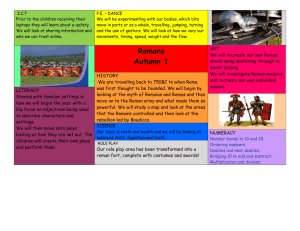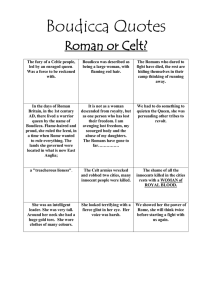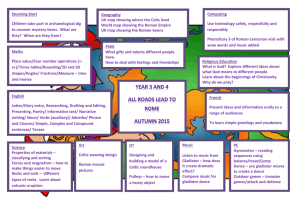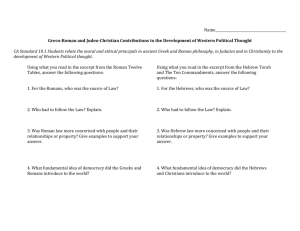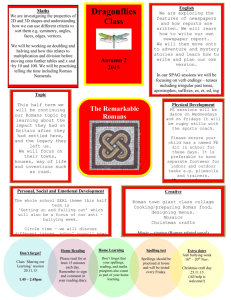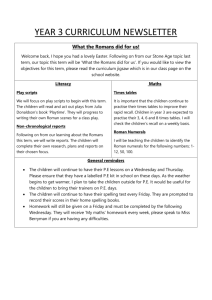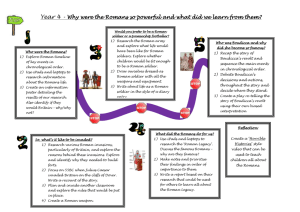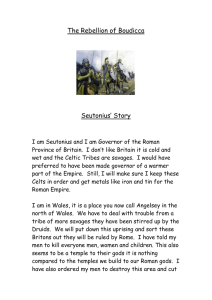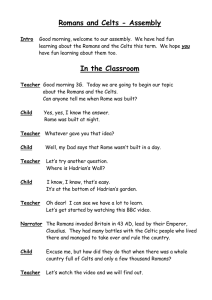Termly Curriculum Map Spring Year 3
advertisement
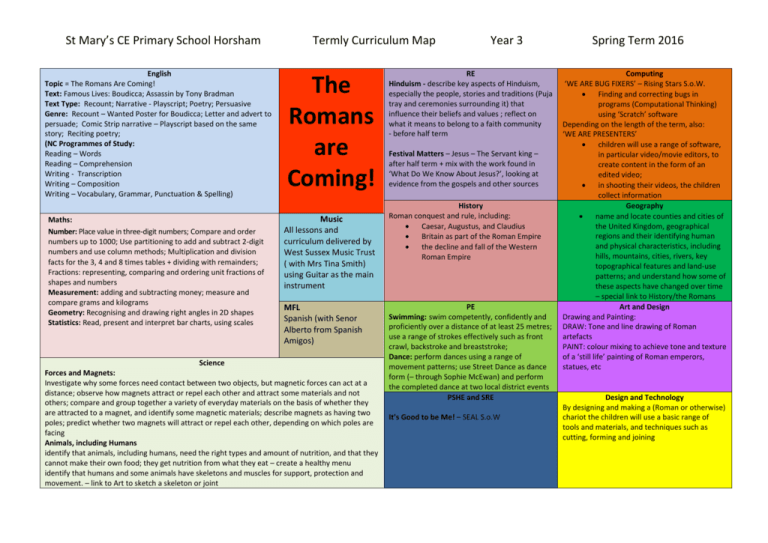
St Mary’s CE Primary School Horsham Termly Curriculum Map English Topic = The Romans Are Coming! Text: Famous Lives: Boudicca; Assassin by Tony Bradman Text Type: Recount; Narrative - Playscript; Poetry; Persuasive Genre: Recount – Wanted Poster for Boudicca; Letter and advert to persuade; Comic Strip narrative – Playscript based on the same story; Reciting poetry; (NC Programmes of Study: Reading – Words Reading – Comprehension Writing - Transcription Writing – Composition Writing – Vocabulary, Grammar, Punctuation & Spelling) The Romans are Coming! Maths: Number: Place value in three-digit numbers; Compare and order numbers up to 1000; Use partitioning to add and subtract 2-digit numbers and use column methods; Multiplication and division facts for the 3, 4 and 8 times tables + dividing with remainders; Fractions: representing, comparing and ordering unit fractions of shapes and numbers Measurement: adding and subtracting money; measure and compare grams and kilograms Geometry: Recognising and drawing right angles in 2D shapes Statistics: Read, present and interpret bar charts, using scales Music All lessons and curriculum delivered by West Sussex Music Trust ( with Mrs Tina Smith) using Guitar as the main instrument MFL Spanish (with Senor Alberto from Spanish Amigos) Science Forces and Magnets: Investigate why some forces need contact between two objects, but magnetic forces can act at a distance; observe how magnets attract or repel each other and attract some materials and not others; compare and group together a variety of everyday materials on the basis of whether they are attracted to a magnet, and identify some magnetic materials; describe magnets as having two poles; predict whether two magnets will attract or repel each other, depending on which poles are facing Animals, including Humans identify that animals, including humans, need the right types and amount of nutrition, and that they cannot make their own food; they get nutrition from what they eat – create a healthy menu identify that humans and some animals have skeletons and muscles for support, protection and movement. – link to Art to sketch a skeleton or joint Year 3 RE Hinduism - describe key aspects of Hinduism, especially the people, stories and traditions (Puja tray and ceremonies surrounding it) that influence their beliefs and values ; reflect on what it means to belong to a faith community - before half term Festival Matters – Jesus – The Servant king – after half term + mix with the work found in ‘What Do We Know About Jesus?’, looking at evidence from the gospels and other sources History Roman conquest and rule, including: Caesar, Augustus, and Claudius Britain as part of the Roman Empire the decline and fall of the Western Roman Empire PE Swimming: swim competently, confidently and proficiently over a distance of at least 25 metres; use a range of strokes effectively such as front crawl, backstroke and breaststroke; Dance: perform dances using a range of movement patterns; use Street Dance as dance form (– through Sophie McEwan) and perform the completed dance at two local district events PSHE and SRE It’s Good to be Me! – SEAL S.o.W Spring Term 2016 Computing ‘WE ARE BUG FIXERS’ – Rising Stars S.o.W. Finding and correcting bugs in programs (Computational Thinking) using ‘Scratch’ software Depending on the length of the term, also: ‘WE ARE PRESENTERS’ children will use a range of software, in particular video/movie editors, to create content in the form of an edited video; in shooting their videos, the children collect information Geography name and locate counties and cities of the United Kingdom, geographical regions and their identifying human and physical characteristics, including hills, mountains, cities, rivers, key topographical features and land-use patterns; and understand how some of these aspects have changed over time – special link to History/the Romans Art and Design Drawing and Painting: DRAW: Tone and line drawing of Roman artefacts PAINT: colour mixing to achieve tone and texture of a ‘still life’ painting of Roman emperors, statues, etc Design and Technology By designing and making a (Roman or otherwise) chariot the children will use a basic range of tools and materials, and techniques such as cutting, forming and joining
